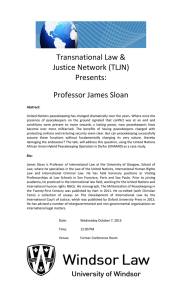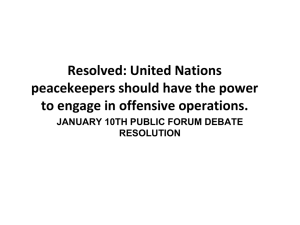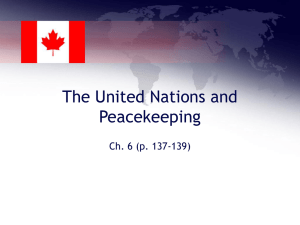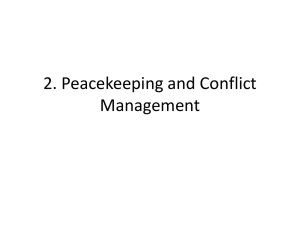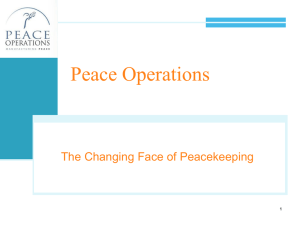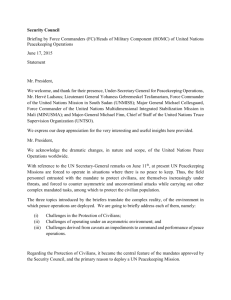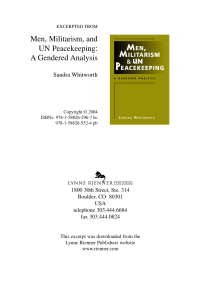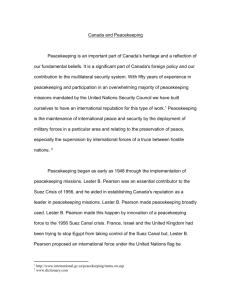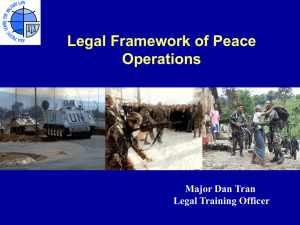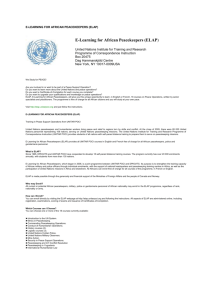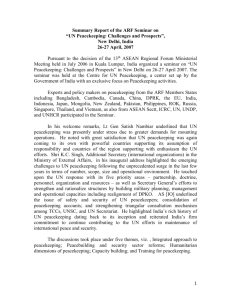Peacekeeping
advertisement
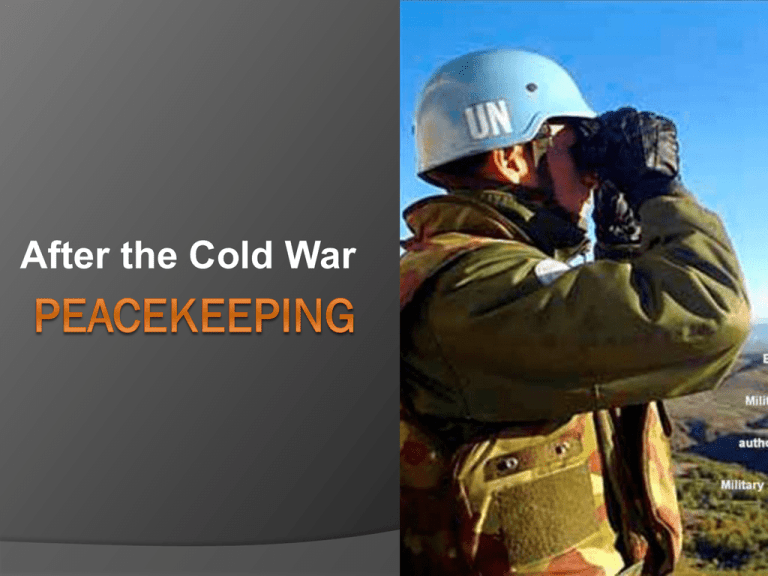
After the Cold War Main Topics: Canada’s International Reputation Canada’s Contributions to World Peace Peacekeeping changed radically once the Cold War was over! More missions Different types of missions More peacekeeping organizations New roles for peacekeepers More Missions There have been over 40 peacekeeping missions since 1990 . The UN alone currently has 16 active peacekeeping missions – these cost an average of $5 billion per year. Currently, over 88,000 peacekeepers from 113 different countries are deployed throughout the world! UN peacekeeping missions - dark blue represents current missions. Different Missions Peacekeepers now keep the peace within states as well as between states. Peacekeeping has turned more into peacemaking: it has become a matter of creating peace where it does not exist. More Organizations The UN is no longer the world’s only peacekeeping organization! Other peacekeeping organizations: NATO Organization for African Unity Organization for Security and Cooperation in Europe New Roles for Peacekeepers Train and organize local police Remove mines Conduct fair elections Assist the return of refugees Protect human rights Intervene to prevent humanitarian disasters. Peacekeepers distributing rice in East Timor Peacekeeping and Canada Ever since the end of the Cold War, Canada has been involved in peacekeeping activities throughout the world. Iraq (1991) In 1991, Canada participated in the first Gulf War as part of a UN force. Canadians helped to push the Iraqi army out of Kuwait. We participated with our air force, our army and our navy! Yugoslavia (1992-1995) After the fall of Communism in 1991, Yugoslavia began to break apart. Yugoslavia was made up of many different ethnic groups, and they all wanted to become independent. Problem: Some Yugoslavian provinces had ethnically mixed populations. What country would these people belong to? Result: Wars broke out between the Serbs, the Croats and the Bosnian Muslims. UN peacekeepers were sent to the region in order to force the rival armies apart. In both Croatia and Bosnia, the peacekeepers were unable to stop massacres and ethnic cleansing from taking place. Somalia (1992) In 1992, soldiers of the Canadian Airborne Regiment were sent to Somalia as part of a very difficult peacekeeping mission: Somalia had been devastated by civil war and famine. There was no central government, as gangs ran parts of the country and controlled the distribution of food aid coming from other countries. Somalia (1992) During this mission, an event took place that permanently harmed the reputation of Canadian soldiers and UN peacekeepers. The Somalia Affair: Somalia (1992) Read the handout titled “Death of Shidane Arone” and respond to the following: Explain why this event harmed the reputation of the entire Canadian military and not just the reputation of those who were directly involved in the crime. Describe the Canadian government’s response to this event. Rwanda (1994) In 1994, there was a civil war in the small African nation of Rwanda, as two ethnic groups, the Tutsis and the Hutus fought for power. The Hutus won and began to organize a genocide against the Tutsis. Result: A UN peacekeeping force was sent to protect the Tutsis. Problem: UN members contributed only 3,000 troops to this force. Problem: The UN peacekeepers were attacked, and most counties removed their soldiers. Result: 500 peacekeepers were left with the task of stopping the genocide. The peacekeeping mission was led by Canadian General Romeo Dallaire. Dallaire warned the international community that a genocide would take place, but his pleas for help were ignored. Result: Over 1,000,000 people were killed in the genocide. Dallaire later wrote a book in which he claimed that “the international community ha[d] blood on its hands.” Do you agree with Dallaire’s statement? Write a point-from list of reasons to support your position.
